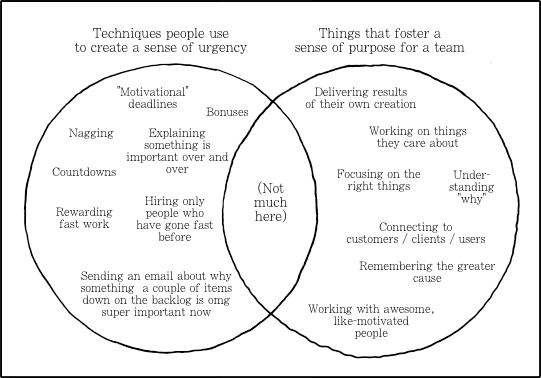Counterpoint: Ben Horowitz on micromanagement - pmarca *ARCHIVE* - bit.ly/1z2b3V
Adam Rifkin stashed this in Management

The post below was written by Ben Horowitz.
Twitter is taking down Posterous, and with it the pmarca archive will be gone.
I'm copying this post to PandaWhale so it's publicly available to all.
That way we'll be able to read Marc's insights even after Posterous is gone.
pmarca archive on PandaWhale: http://pandawhale.com/ifindkarma/pmarca-archive
Source of the post below: http://pmarca-archive.posterous.com/coun...
Stashed in: @bhorowitz, pmarca Archive
[This is a guest post from my business partner Ben Horowitz, reacting to my recent post about hiring, managing, promoting, and firing executives. I have italicized the parts where he really tears into me for your added humor value.]
While I enjoyed Marc's post on hiring and firing executives, I think that he unfairly dissed micromanagement.
Here's why.
Everyone knows that the hyper-controlling manager with the severe personality disorder who micromanages every crummy decision is no fun to work for. However, it is wrong to condemn the practice of micromanagement on that basis.
Specifically, there are times and situations where micromanaging executives is not just ok, but also the right thing to do. Andy Grove has an excellent explanation of this in his classic book High Output Management, where he describes a concept called "Task Relevant Maturity". Andy explains that employees who are immature in a given task require detailed training and instruction. They need to be micromanaged. On the other hand, if an employee is relatively mature in a task, then it is counterproductive and annoying to manage the details of their work.
This is also true when managing executives. Marc might think that he hires an executive because she has the experience and know-how to comprehensively do her job, so any detailed instruction would be unwise and unwarranted. Marc would be wrong about that. It turns out that even -- and maybe especially -- executives are also immature in certain tasks.
It is almost always the case that a new executive will be immature in their understanding of your market, your technology, and your company -- its personnel, processes, and culture. Will the new head of engineering at Ning walk in the door with Marc's understanding of the development process or the technology base? Would it be better for this new head of engineering to make guesses and use her own best -- not so good-- judgment, or for Marc to review the first say 20 decisions until the new exec is fully up to speed?
In reality -- as opposed to Marc’s warped view of reality -- it will be extremely helpful for Marc [if he were actually the CEO, which he is not] to meet with the new head of engineering daily when she comes on board and review all of her thinking and decisions. This level of micromanagement will accelerate her training and improve her long-term effectiveness. It will make her seem smarter to the rest of the organization which will build credibility and confidence while she comes up to speed.Micromanaging new executives is generally a good idea for a limited period of time.
However, that is not the only time that it makes sense to micromanage executives. It turns out that just about every executive in the world has a few things that are seriously wrong with them. They have areas where they are truly deficient in judgment or skill set. That’s just life. Almost nobody is brilliant at everything. When hiring and when firing executives, you must therefore focus on strength rather than lack of weakness. Everybody has severe weaknesses even if you can’t see them yet. When managing, it’s often useful to micromanage and to provide remedial training around these weaknesses. Doing so may make the difference between an executive succeeding or failing.
For example, you might have a brilliant engineering executive who generates excellent team loyalty, has terrific product judgment and makes the trains run on time. This same executive may be very poor at relating to the other functions in the company. She may generate far more than her share of cross-functional conflicts, cut herself off from critical information, and significantly impede your ability to sell and market effectively.
Your alternatives are:
(a) Macro-manage and give her an annual or quarterly objective to fix it, or...
(b) Intensively micromanage her interactions until she learns the fundamental interpersonal skills required to be an effective executive.
I am arguing that doing (a) will likely result in weak performance. The reason is that she very likely has no idea how to be effective with her peers. If somebody is an executive, it's very likely that somewhere along the line somebody gave her feedback -- perhaps abstractly -- about all of her weaknesses. Yet the weakness remains. As a result, executives generally require more hands-on management than lower level employees to improve weak areas.
So, micromanagement is like fine wine. A little at the right times will really enhance things; too much all the time and you’ll end up in rehab.










8:47 AM Apr 30 2013